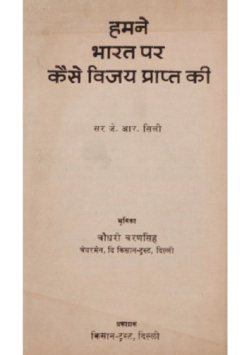Extracts from The Expansion of England by Sir John H Seeley, 1883
John Seeley (1834-1895) was a founder of Imperial British History, and was a professor of modern history at the University of Cambridge from 1869.
“ ….The Expansion of England (1883) answered to his theory that history should be used for a practical purpose and pointed out how and why Britain gained its colonies and India, the character of the British Empire and the light in which it should be regarded. As a historical essay, the book was a fine composition, and its defence of the empire was then very persuasive. His defence consisted largely of the claim that British rule was in India's best interest. …... The essay was reprinted ten times in the year in which it was published and many more times in later years. Seeley was rewarded for public service by being made a Knight of the Order of St Michael and St George ….” Source: Wikipedia
The Expansion of England included Chapters titled How We Conquered India, reproduced in this booklet published by The Kisan Trust in July 1984. This brutal reality of British victory over an internally divided civilisation and society struck hard and deep into Charan Singh’s nationalist heart. These chapters transcend being a chronicle of military victories, and lays bare the complex web of political manoeuvres, administrative strategies, and economic policies that solidified British control. These also dissect how British exploited rivalries between Indian rulers, forging temporary alliances to establish footholds in strategic territories.
Far from sugarcoating the colonial era, Seely exposes the exploitative underpinnings of British rule. He lays bare how economic instruments like land revenue systems and restrictive trade policies functioned as conduits to funnel wealth from India to Britain. This text explores the cultural and social dimensions of colonialism, including the implementation of education systems intended to cultivate a class of Indians aligned with British interests.
Hence, a study of Seeley’s work educated his colonial subjects, like Charan Singh, on the reasons how Great Britain conquered a land as vast and diverse as India by only a handful of white men. Singh quotes Seeley “Indian can hardly be said to have been conquered at all by foreigners; she has rather conquered herself.” Charan Singh's foreword underscores the detrimental effects of British colonialism on India's socio- economic fabric, emphasising the importance of grappling with this history to forge a better future. He hopes “through a better understanding of our own weaknesses that we can hope to erase them.”


